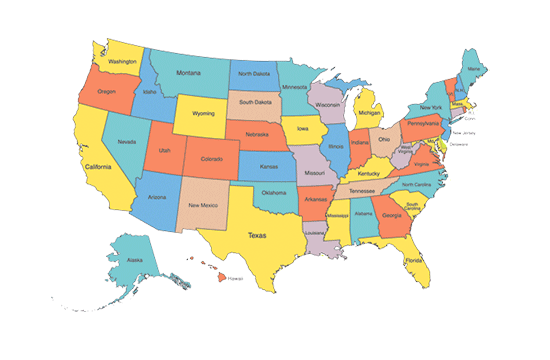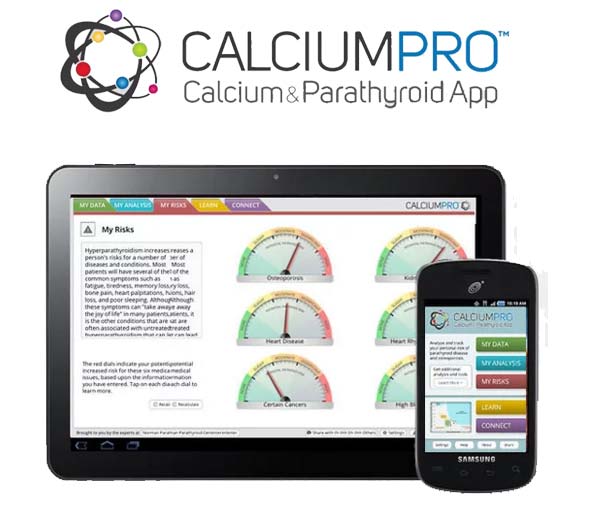Post Operative Questions
Everything you want to know about the days and weeks after your parathyroid operation.
- Can I break calcium pills in half?
- Can I take chewable calcium pills?
- How long should I stay in Tampa?
- When can I fly home?
- Can my family stay with me?
- When can I drive myself?
- When and what can I eat?
- When can I exercise?
- When do I take bandage off?
- There is blood on my bandage.
- Is it ok if part of the wound isn't covered by the bandage?
- How long do I use ice-pack?
- Do I take 1 calcium pill or 2?
- What are symptoms of low calcium?
- Weird symptoms from low calcium?
- What is maximum calcium I can take?
- Is there best time to take calcium?
- Multi-vitamins and magnesium
- Nausea after the operation
- My throat is sore.
- Hurts a little when I swallow
- Swelling around the incision.
- Is bruising around the incision dangerous?
- Headaches after the operation
- Taking calcium with thyroid hormone
- Will calcium make me constipated?
- When will bone pain go away?
- Muscle cramps – is it low calcium?
- Took bandage off and wound is red
- I'm coughing up a lot of phlegm
- When am I going to feel big change?
- Do I get results of my biopsy?
- When should I see my doctor?
- When should I get new DEXA Scan?
- Should I take Fosamax or Boniva?
- Will my GERD get better?
- Should I keep taking blood pressure pills?
Can I break calcium pills in half?
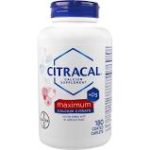 We advise patients to take Citracal Maximum after parathyroid surgery. Yes, they are huge pills, and yes you can break them in half. It is also OK to crush the calcium pills and put into a cup of water, or put into apple sauce or yogurt. We put you on a high dose of calcium for the first two weeks after your operation, but after that, we don’t really care what type of calcium you take. But you should still take at least 600 to 1000 mg of calcium per day to help your bones recover some density and strength.
We advise patients to take Citracal Maximum after parathyroid surgery. Yes, they are huge pills, and yes you can break them in half. It is also OK to crush the calcium pills and put into a cup of water, or put into apple sauce or yogurt. We put you on a high dose of calcium for the first two weeks after your operation, but after that, we don’t really care what type of calcium you take. But you should still take at least 600 to 1000 mg of calcium per day to help your bones recover some density and strength.
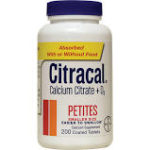 Citracal has “petite” pills which are smaller than the regular ones, but they have less calcium in each pill. You need to take 3 petite pills for every 2 Maximum pills. Read the dosage on the bottle.
Citracal has “petite” pills which are smaller than the regular ones, but they have less calcium in each pill. You need to take 3 petite pills for every 2 Maximum pills. Read the dosage on the bottle.
Bottom Line:
Yes, you can crush or break your calcium pills. You can take them with or without food. You should try to separate calcium pills from certain medications, particularly thyroid hormone replacement (levothyroxine, Synthroid). Ideally, you should separate calcium and thyroid hormone replacement by four hours.
If you really can’t stand the Citracal Maximum
There are other options. We like calcium CITRATE because it tends to be well tolerated. Most of the chewable calcium tabs out there contain calcium CARBONATE, a different form of calcium that often causes constipation if you take lots of it (which you need to do after parathyroid surgery).
Most forms of calcium CITRATE are in hard pill form, like Citracal Maximum.
There is a chewable form of calcium citrate: Solaray Calcium Citrate Chewable. 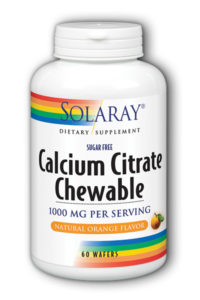 You can buy it online, at Whole Foods, or in vitamin stores. It’s not as common as Citracal Maximum, so you usually cannot find it at the big-name pharmacies. Note that it does not contain Vitamin D, so you will need to also buy a separate Vitamin D pill. Vitamin D pills tend to be tiny, and some of them will dissolve in your mouth. Take any over-the-counter Vitamin D3, 1000 units daily. If you have significant bone loss, we may tell you to increase this. Note that you don’t have to take Vitamin D with every dose of calcium to get the benefit of Vitamin D. You can take the Vitamin D just once a day, but you should spread out the calcium.
You can buy it online, at Whole Foods, or in vitamin stores. It’s not as common as Citracal Maximum, so you usually cannot find it at the big-name pharmacies. Note that it does not contain Vitamin D, so you will need to also buy a separate Vitamin D pill. Vitamin D pills tend to be tiny, and some of them will dissolve in your mouth. Take any over-the-counter Vitamin D3, 1000 units daily. If you have significant bone loss, we may tell you to increase this. Note that you don’t have to take Vitamin D with every dose of calcium to get the benefit of Vitamin D. You can take the Vitamin D just once a day, but you should spread out the calcium.
Each pill of Solaray calcium citrate chewable has 250 mg of calcium, so if you are replacing the Citracal with this, you should start with 6 pills per day, then taper (6 per day for a week, then 4 per day for a week, then 2 per day).
Can I take chewable calcium pills?
Yes, there is a chewable option – but be careful!
Most forms of chewable calcium contain calcium carbonate, which tends to cause constipation when you take a lot of it. Calcium citrate is the form of calcium in Citracal Maximum, the one that we advise you to get. If you go to your pharmacy and pick up a chewable calcium, it will most likely contain calcium carbonate or tricalcium phosphate – you likely won’t be able to find a chewable one with calcium citrate in the big-name pharmacies.
But if you really do not do well with large pills
There is an option: Solaray Calcium Citrate Chewable. You can buy it online, at Whole Food, or in vitamin stores. It’s not as common as Citracal Maximum, so you usually cannot find it at the big-name pharmacies.
Each pill of Solaray calcium citrate chewable has 250 mg of calcium, so if you are replacing the Citracal with this, you should start with 6 pills per day, then taper (6 per day for a week, then 4 per day for a week, then 2 per day). Also: this does not have Vitamin D. You will need to take a separate Vitamin D pill. Vitamin D pills tend to be tiny, and some of them will dissolve in your mouth. Take any over-the-counter Vitamin D3. You should take 1000 units of Vitamin D daily. If you have significant bone loss, we may tell you to increase this. You do not need to take Vitamin D with every dose of calcium. We want you to spread the calcium out throughout the day, but Vitamin D can be taken once a day.
How long should I stay in Tampa?
Traveling by car
If you are traveling by car, you should feel free to get in the car after your operation and drive on home. Of course, you can’t drive, but you can be a passenger. If you live in Florida and are traveling by car, you should plan on driving home the same day, although some patients do choose to stay the night of surgery in Tampa. Remember, the first 3 patients of the day can expect to be out of the hospital by 9:45 am, so traveling home by car is easy. However, patients who are the last ones of our day may not leave the hospital until 6:00 pm or so. These later patients should plan on staying in the Tampa area if they have to drive more than an hour or two.
Traveling by airplane
About 65% of our patients live outside of Florida, with about 8% living outside of the United States. Thus, more than half of our patients fly to Tampa for their operation. We recommend flying home the day after the operation. We do not recommend flying the day of surgery. Trust us, we’ve done this well over 30,000 times. Spend the night of surgery in Tampa, (or drive to Orlando, or the beach, or somewhere else in Florida), and then fly home the next day.
Flying to other countries
If you have flown into Tampa from another country, you can still plan on flying home the day after surgery. Interestingly, most elect to spend one more day in Tampa going to the museum, to the Aquarium, to the Dali Museum, to the beach, or to Disney. But you can feel free to fly back to another country the day after surgery if you chose.
Dali Museum, to the beach, or to Disney. But you can feel free to fly back to another country the day after surgery if you chose.
When can I fly home?
About 50% of our patients fly here to see us.
 Those of you who fly into Tampa should plan on coming the night before and leaving the day after. There is virtually no reason to stay another day, and we have had well over 10,000 people get on a plane the very next day and fly across the country, or across the oceans.
Those of you who fly into Tampa should plan on coming the night before and leaving the day after. There is virtually no reason to stay another day, and we have had well over 10,000 people get on a plane the very next day and fly across the country, or across the oceans.
If you are going to stay in Tampa, don’t stay for medical reasons—stay to go to the beach or to Disney world. You should feel very confident to purchase airplane tickets for the day after the operation.
Can my family stay with me?
Yes, your family is welcome!
Some people come by themselves for parathyroid surgery and that is perfectly fine. But most people bring a family member or two with them to the hospital. If somebody comes with you, we strongly suggest that they download this app also so they can read about what is happening at all times. It really helps them and keeps them relaxed knowing where you are in the process, what is happening, and what is coming up next.
If you are by yourself, we will ask you if there is anybody back home you would like us to call when your operation is completed.
Family / friends can stay with you
Your family members can be with you throughout almost all of the day. You will leave them for a few minutes at the start of your time with us when you to get an IV in your wrist/arm and so you can change your clothes. They will be able to sit with you after that and keep you company and participate in all of the discussions with the surgeons / nurses.
You will leave your family again for about 30 minutes when you go for your scan, but they typically will chill in your assigned room watching TV or reading. They do not go to the scanner with you (there isn’t room for them in the scanning room, and there are other patients being scanned as well). We do about 16 or 17 sestamibi scans every day, almost 4000 per year. Nobody is better!
Food for the family
If you are one of the first 6 patients of our day, we typically have your family / friends hang out in your room until you go to the operating room, and then we send them down for breakfast in the cafeteria. If you are patient 7 or later, we typically send your friends/family for breakfast while you get the scan. They have about 30 minutes to eat while you are getting the scan and then they come back up to be with you.
When you go into the operating room (which is located just down the hallway from your pre-op room), we will send your family out to the waiting room or to the cafeteria (which is very nice and right down the elevator from the Parathyroid Center). We also have a Starbucks if they feel a need for some craft java.
Surgeons talk to your family after surgery
Once the operation is over, one of the surgeons will come to the waiting room to find your family and give them your photo and let them know you are doing great. This is typically just over 1 hour after they left you. And then, after you wake up and feel like chatting (usually about 1 hour after the operation is over), you will change into your regular clothes and your family/friends can come back to join you again for the last 30-45 minutes with us. This allows your family to participate in the final visit with the surgeons and be a part of the last instructions we give you.
Before you leave the hospital
At least one of the surgeons will visit with you and your family together before you go. One last point: have your family download this app for themselves. It won’t have a few personalized things that yours does, but they can have access to all of this information and they will be happier knowing what is going on.
What your family should bring
The people coming with you should bring something to keep them occupied. A book, a computer, or somebody else to chat with. They will be with you most of the time, but obviously you have other things to do. Your little room has a TV that they/you can watch (the remote is attached to the long white wire). We have WiFi for everybody (TGHguest) so they can get some work done on a computer.
We will send your family off to the cafeteria while you are getting your operation. The cafeteria is actually quite nice, and is located on the first floor right below the Parathyroid Center (you walked by the cafeteria getting to our elevators). However, we have noticed that some family members / friends bring some snacks along with them. It is OK for them to have snacks in your room, but we don’t want them to bring entire meals up into the patient areas (our doctors will eat it if they do!). Small snacks are a great idea for your family to bring, but you can’t have any!
Starbucks
We also have a Starbucks Coffee in the hospital. This is on the first floor, but not near the cafeteria. If your family wants Starbucks, the head to the first floor and start walking. Anybody can point them in the right direction.
When can I drive myself?
You can be a passenger the day of surgery, but you cannot drive yourself until the day after surgery. The anesthetic drugs that you are given will make you sleepy and have poor concentration and judgement.
 We know that all of our male patients are excellent drivers, excellent drivers, but please do us a favor and don’t drive the Buick until tomorrow.
We know that all of our male patients are excellent drivers, excellent drivers, but please do us a favor and don’t drive the Buick until tomorrow.
When and what can I eat?
Eat anything and everything!
You can eat anything you want as soon as the operation is over. You will have no restrictions. We will give you a Popsicle in the recovery room and most people feel best when eating/drinking cold liquids. But you can eat any food you want, hot or cold.

You may want to have a nice celebratory dinner the night of surgery. If your doctors back home previously told you that you had to avoid calcium-rich foods, you can ignore this now. Your calcium problem is over and you can eat anything you want!
When can I exercise?
We allow our patients to do pretty much anything they want starting the day after the operation. We suggest vigorous exercising should be delayed about 5-7 days, but yoga is fine the day after surgery as is long walks.
Jogging is fine on day 4. You can go play golf around day 4 as well. Remember, if your neck hurts when you are exercising, then stop—your body is trying to tell you to stop! This topic is also covered in the “Post op Instructions” section of the app.

When do I take bandage off?
You have a small, simple bandage over the incision which will stay in place without any worry. You can shower the day after surgery and get the bandage wet. Just pat it dry.
The bandage should be removed on the 7th day after the operation. It may be hard to peel off, but do not leave it on more than 7 days. It often helps to take the bandage off after getting out of the shower when it is wet. Do not leave it on more than 7 days. If it comes off sooner, then don’t worry, just keep it clean. No worries, we’ve never seen one of these incisions get an infection. Also, don’t worry if it gets a few drops of blood on it.
There is blood on my bandage.
Most patients get some blood on the bandage. This is normal. Ignore it.
About half of patients will notice that the ice-pack we provide you to put on the wound gets some blood on it. This is common and is perfectly fine. Sometimes blood will seep out from the edge of the wound and get blood on your shirt or pillow case. This is not a problem and should not cause concern.
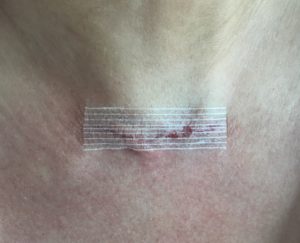
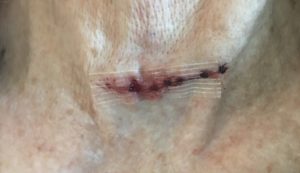
Is it ok if part of the wound isn't covered by the bandage?
Occasionally the bandage doesn’t cover the very edge of the wound. This is not a problem. The skin is sewn shut with stitches on the inside and the wound will heal perfectly fine this way. The steri-strip used on the wound is not meant to be a seal that keeps out germs. It is there only to help the stitches hold the skin together while the skin seals itself (which occurs within 24 hours).
How long do I use ice-pack?
30 minutes on, 30 minutes off
We provide every patient with an ice-pack to put on their wound to help keep the swelling down. Our nurses will put fresh ice in it just before you leave. We want you to use this 30 minutes every hour (30 minutes on, and 30 minutes off). We are quite happy if you decide you want to keep it on for an hour or more at a time if that is what you want to do.
Use the day of surgery only
We have found that the ice doesn’t help much after the first day. So our recommendations are to stop using the ice-pack at bedtime the day of surgery. If you feel better using it the next day then feel free to do so, but most people get benefit only on the day of surgery.
Also note that it is very common to get a couple drops of blood on the white ice-pack we give you. That is perfectly OK. No worries!
Do I take 1 calcium pill or 2?
This is a question we get when people read the small print on the calcium bottle which says there is “630 mg of calcium citrate per dose, and a dose is 2 pills”. We have learned from putting tens of thousands of parathyroid patients on calcium that the best and easiest way to do everything in “pills” not calcium milligrams. When we say to take 5 pills per day, that means 5 pills per day… not 10 pills per day.
One pill, means One pill
When we say “take 3 pills the second week of surgery, we are talking about 3 Citracal tablets, each one containing 315 mg calcium. Wanna know why we use calcium citrate and not calcium carbonate? Because taking a lot of calcium carbonate makes many people constipated. Yuk, that isn’t something you wanted to know was it?
What are symptoms of low calcium?
A few of our patients will get symptoms of low calcium after parathyroid surgery. If you do, you need to take more pills. Less than 1 in 20 of our patients gets these symptoms.
The symptoms of low calcium are:
- Tingling around your mouth, lips, nose and cheeks.
- Tingling in your fingertips.
- Cramps in your hands/wrists.
- Feeling like your body is vibrating.
This only lasts a few days and is treated by taking more calcium.
We have lots more on this topic in the Post-Op Instructions section of this app.
Weird symptoms from low calcium?
Weird symptoms after parathyroid surgery
Sometimes a patient will call and say “my fingers and my face feel weird, but it doesn’t seem exactly like what I read about the symptoms of low calcium. Is this low calcium?” Symptoms of low calcium can be tricky, and don’t always fit the textbook descriptions. While the most common sensation is described as numbness or tingling in the finger tips or lips, other sensations such as vibrating, trembling, and just an odd feeling of the skin can also occur.
Never on the day of surgery
Symptoms of low calcium usually start around on the third day after the parathyroid operation, and usually involve the fingers and the face first. If it is 3 days after your operation, and you have a new numbness-like sensation in your hands, you can assume it is due to low calcium, and that you need to take more. Start with 2 extra Citracal.
Only one in 20 of our patients get any symptoms of low calcium, and it only lasts a day or two in almost all cases. Note that the symptoms of low calcium usually start three days after parathyroid surgery. It never occurs the day of surgery or the next day. It is very uncommon on the second day, and if you are one of the rare patients to gets low calcium symptoms after parathyroid surgery at the Norman Parathyroid Center, it almost always starts on day 3. It is extremely rare for these symptoms to start 2 weeks or more after surgery. So if you had surgery a few weeks or a month ago and now notice some new numbness in your fingers, it is probably NOT low calcium.
What is maximum calcium I can take?
People who are having a few tingles from low calcium after parathyroid surgery occasionally get concerned that they are taking too many calcium pills. The call and ask “I going to overdose?” If you have been feeling low calcium symptoms and have started taking more calcium, you are probably wondering what the limit is. If you truly have low calcium, then there is no absolute limit – you need to take as much as you need—but we need to know.
We want you to give us a call when you get to 10 pills so we can chat about the symptoms and make sure you are doing the right thing. We want to make sure that it is really low calcium that is causing your symptoms, and not something else. We also want to guide you through how many pills to take each day and how to taper off that high dose once your normal parathyroids start kicking in.
Most people never get low calcium symptoms. Read the BIG PICTURE about low calcium.
Is there best time to take calcium?
Your intestines can only absorb so much calcium at a time, which is why we recommend spreading the calcium throughout the day. When you are down to two pills daily, you can take these together and this can be done at any time of the day. But when on 4 or more pills per day, spread them out during the day.
Should I get up during the night?
No, it is not necessary to wake up in the night to take your calcium pills. It takes the body 4-5 hours to completely absorb a calcium pill. The pill you take now is still in your intestines for hours. So save one of your calcium pills for bedtime.
Multi-vitamins and magnesium
Magnesium after parathyroid surgery
If you have significant bone loss, you may also benefit from taking a daily magnesium supplement in addition to calcium and a multi-vitamin. Magnesium is important for calcium metabolism and bone remodeling which is going to happen after your parathyroid operation, which is good! There are lots of different forms of magnesium out there, and any of them will work. Note that magnesium has a laxative effect, and certain forms (e.g. magnesium citrate) are more often used to treat constipation. If you buy a magnesium that is meant to treat constipation (most often liquid magnesium citrate), the dosage will be higher than what you need, and will produce loose bowel movements.
We usually recommend taking either magnesium oxide or magnesium malate, which may also help with muscle cramps. Adults should get about 400 mg a day of magnesium. If you are requiring lots of calcium postoperatively, we recommend increasing the magnesium dose to 800 mg a day while you are needing the higher doses of calcium. We discuss multi-vitamins in more detail on a different page.
Nausea after the operation
We have lots of tricks to prevent!
We know that some people get nauseated after anesthesia. We take several measures to make sure this doesn’t happen to you—we don’t like it when our patients are nauseated! First, know that it is caused by the anesthesia drugs, and a short, quick operation means less drugs.

Thus, many patients who experienced nausea with previous operations will not get it at our parathyroid center. We also give all of our patients an IV medication in the operating room to cut down on the incidence of post op nausea. If you have a history of nausea with anesthesia, we can give a scopolamine patch behind your ear to help decrease the chances of nausea.
It is very rare for the nausea to last more than a few hours or into the next day. If it does, please know that it will go away soon and you should try to keep liquids down. The best trick is to drink Gatorade and/or water and eat crackers. Ginger is a great medicinal for this purpose, so many people swear by ginger-containing foods like ginger-ale, and ginger candies.
My throat is sore.
Yes, soreness is normal for the first week after the operation.
Some people have a sore neck and sore throat after the operation for a few days. This is normal and you should feel free to take your favorite or preferred pain medication for this.  We have also found that cold drinks and smoothies provide relieve more than hot drinks. This is also a great excuse to eat ice cream! Some people get the best relief by alternating ibuprofen and Tylenol every 4 hours.
We have also found that cold drinks and smoothies provide relieve more than hot drinks. This is also a great excuse to eat ice cream! Some people get the best relief by alternating ibuprofen and Tylenol every 4 hours.
Hurts a little when I swallow
Sometimes a patient will contact us a few days or a week after the operation and say “It feels like something is stuck in my throat. Is this normal?” Yes, this is normal and can be present for a few days. The muscles in your neck are healing, and during that time things can feel sore or “tight” when you swallow. It always gets better. Sometimes swallowing can feel “different” for a few weeks after the operation – this is normal too and will improve as everything heals. Remember, even if your incision looks perfect on the outside, there is still a lot of healing going on inside your neck for weeks after the operation (which is true for every operation, anywhere in the body).
Swelling around the incision.
“Hey guys, I have some swelling around and under my incision. Is this normal? When will that go away?” Yes, it will always go away! It is very normal to have swelling around the incision, often for a few weeks. The incision also may feel lumpy or and the skin may feel hard – this is all normal and will go away as everything heals.
Should I massage the scar?
No, you do not need to “massage” the scar—that won’t do anything. It is also important to understand that there are a lot of stitches inside that are holding the tissues together and these stitches typically take about 4-5 weeks to dissolve. Relax and give it time—our incisions almost always look great in a few months. We have more on this topic in the Post Op Instructions section.
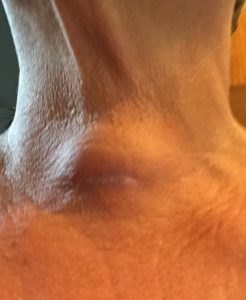 This “golf ball” swelling happens sometimes and is harmless. It will go away on its own. Don’t fret about it, and don’t let your doctor freak out about it. It will go away!
This “golf ball” swelling happens sometimes and is harmless. It will go away on its own. Don’t fret about it, and don’t let your doctor freak out about it. It will go away!
Is bruising around the incision dangerous?
Bruising around the incision is due to a small amount of bleeding right under the skin. It is normal and will heal just like any other bruise. The bruise can even start to move down onto your chest over a few days – this does not mean that you are still bleeding. It is just the effect of gravity. It doesn’t look pretty, but it doesn’t affect your healing and it is not dangerous. If you are our patient and are worried about how your neck looks, just take a selfie and text us the photo - we will let you know right away whether you need to be concerned or not.
Bottom line:
Bruising is a normal part of surgery. We take lots of steps to try to prevent it during our parathyroid operations, but sometimes it happens. It can be ugly, but it isn’t dangerous.
Headaches after the operation
Headaches after anesthesia
Some people have a headache when they wake up from anesthesia. This isn’t very common, only about 5% of our patients get this. This can last a few hours but it always goes away. There is nothing to worry about. Ibuprofen, Advil, Motrin, Aleve are the best! Tylenol is not very good at this.
Headaches for a week?
About 1 patient out of 250 will get a few headaches during the first two weeks after the operation. The key here is to know that it is temporary and will go away. The most important thing to do is to drink lots of water and stay very well hydrated. You are going through hormone shifts and some people tolerate this differently than others. It is perfectly OK to take whatever pain medications you want. Ibuprofen, Motrin, Advil and Aleve are our favorites. Tylenol is ok but most people do better with the others.
Taking calcium with thyroid hormone
Calcium can be taken with other medications, with a few exceptions, most notably thyroid hormone pills. Do not take calcium at the same time as thyroid hormone because it can affect the absorption of the thyroid hormone. If you take levothyroxine, Synthroid, Armour, or any other form of thyroid hormone, wait 4 hours before or after taking the thyroid pill before you take the calcium pill. Taking calcium at the same time will mean that your body won’t receive the full dose of the thyroid hormone.
OK to do it for a week or two
We have learned that it is just fine if we break this rule during the first two weeks of the operation when you are taking lots of calcium pills, so don’t worry about this for the first two weeks. But long term be sure to separate these by at least 4 hours.
If you are getting up in the middle of the night to go to the bathroom, this would be a good time to take your thyroid pill.
Other medications that should not be taken at the same time as calcium are: ciprofloxacin or other “-floxacin” antibiotics (wait 1 hour), tetracycline antibiotics (wait 4 hours), bisphosphonates such as alendronate (Fosamax) or risedronate (Actonel) (wait 1 hour). This list is not definitive, and if you have questions about any of your medications and its interaction with calcium, please ask your physician.
Will calcium make me constipated?
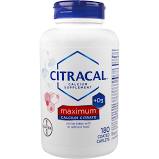 We recommend Citracal because it tends to be well tolerated and the type of calcium in it (calcium citrate) does not normally cause constipation, unlike other forms of calcium. Calcium carbonate, the most common calcium supplement (in TUMS, Oscal, etc) very frequently causes constipation when you take more than 3-4 per day. Citracal can sometimes do the opposite – occasionally it causes loose stools or diarrhea but that is very uncommon which is why we recommend it.
We recommend Citracal because it tends to be well tolerated and the type of calcium in it (calcium citrate) does not normally cause constipation, unlike other forms of calcium. Calcium carbonate, the most common calcium supplement (in TUMS, Oscal, etc) very frequently causes constipation when you take more than 3-4 per day. Citracal can sometimes do the opposite – occasionally it causes loose stools or diarrhea but that is very uncommon which is why we recommend it.
Some people get bloating or discomfort when taking lots of calcium the first week, but this is often not the calcium and may just be due to the changes in hormones that you are going through after removing the hormone-producing tumor.
If you are having loose stools while taking Citracal, try taking a different form of calcium supplement, such as Oscal D (calcium carbonate and Vitamin D). If you are constipated postop, normally this is due to anesthesia from the operation, and will get better on its own. You can take over-the-counter laxatives or stool softeners to help get things moving. Big picture… no worries, this always gets better. Many positive hormone changes will be coming your way, it’s not all negative.
There is more on the topic of poop in the orange Frequently Asked Question section of this app.
When will bone pain go away?
Bone pain after parathyroid surgery
Most people with bone pain that is due to their parathyroid problem will experience an immediate improvement following parathyroid tumor removal (usually within an hour of the operation). This can be life-changing! This is usually people who have had a parathyroid problem for 8 years or longer, those with big tumors, and those with osteoporosis.
Does the bone pain come back?
A few patients notice that some pain returns a week or two after the operation. The reason for this is not clear, but is likely a result of bone remodeling (rapid healing) that occurs after parathyroid surgery. Over time, this remodeling leads to improved bone density, but may cause discomfort. We recommend that you continue calcium and Vitamin D supplementation, and if you have not done so, start taking a daily magnesium supplement, which is important for calcium metabolism and bone health. Your bones will be much healthier with the parathyroid tumor gone – any bone pain that is associated with the parathyroid will be gone in days or weeks.
What if my bones still hurt a month later?
If your bones and joints hurt more than a few weeks after the parathyroid operation, then the pain isn’t related to the parathyroid problem. It is possible that the parathyroid problem caused (or increased) destruction of your bones and they are now damaged so that you need a hip replacement or something like that. Yes, we see this frequently. The bottom line is this: Bones hurt for a lot of reasons. If the bone pain is due to the parathyroid problem (directly) then it will be gone in a week or two. If the pain lasts longer, or comes back in a year or two, it isn’t due to the parathyroid problem. And no, you aren’t getting another parathyroid problem–that’s why we check them all.
Muscle cramps – is it low calcium?
Muscle cramping can be from low calcium, particularly if it is associated with the “classic” symptoms of numbness or tingling in the hands or face. In this case, it is happening within the first week of the operation and taking more calcium will help. If you are having prolonged muscle cramping or muscle spasms in your wrists or hands within the first week of surgery, you should take more calcium immediately and let your surgeon know, as this can be a sign of very low calcium.
More general muscle achiness is less likely to be due to low calcium if you aren’t also having symptoms of numbness and tingling. You should start taking a magnesium supplement if you are having cramps – this often helps even without taking more calcium. You can also try taking an extra 2 Citracal to see if that helps, but it may not, in which case you should not continue to take more calcium without speaking with your surgeon.
If you are having muscle cramps beyond the first week of surgery, we recommend starting a magnesium supplement, in addition to your calcium and Vitamin D. Magnesium is very important for calcium metabolism, and helps with postop symptoms. For muscle cramps, we recommend magnesium malate. Adults should get about 400 mg a day of magnesium. If you are requiring lots of calcium postoperatively, we recommend increasing the magnesium to 800 mg a day while you are needing the higher doses of calcium. It is also important to stay well hydrated for the first week or two after parathyroid surgery.
Took bandage off and wound is red
Redness is a normal part of healing. All wounds get red and look a little bit irritated when you take the bandage off 1 week after the operation, so you should expect some of this. It can also be itchy which is another normal aspect of healing. If this is bothersome, you can put some hydrocortisone cream on it for 1-2 days and it will clear up. We have never seen a wound infection following a parathyroid operation. That doesn’t mean it can’t happen, but the blood supply in the neck is very rich and we give all our patients a dose of IV antibiotics in the operating room. If you have any questions, take a picture and text it to us.
I'm coughing up a lot of phlegm
Gross!
This is not very common at all, but after the procedure, a few of you might notice that you need to cough up extra mucus for a few days. This is normal and is not a sign of infection or any other kind of trouble. Drink lots of water to keep the mucus thin also makes it go away faster. If it is not improving or is getting worse after a week or more, consult your physician.
When am I going to feel big change?
Sometimes we get a call from a patient that is worried that their life didn’t change overnight after the operation. The will say “It’s been a few days since my operation and I haven’t noticed significant improvements. What’s wrong?” The answer is simple: Nothing is wrong.
Please read our Post Op Instructions and read the section about the Rabbit and the Turtle. Some people feel amazing in the days after their operation. But others don’t, and that’s OK. Your body has to adjust to a large shift in hormone and calcium levels, and some folks take a week or two to get over that. Over time you will feel the benefits of parathyroidectomy. It’s fine if you can’t feel the benefit in the first days or weeks. You will get there. You may be one of the turtles, but they get to the finish line too!
Do I get results of my biopsy?
Parathyroid Glands
Our surgeons take a very small “shave” biopsy (like the head of a pin) of the normal parathyroid glands to see if they are normal or abnormal, and to measure how much parathyroid hormone (PTH) they are producing. These small biopsies go to the pathologist who generates a report that simply says “parathyroid tissue identified”. Parathyroid tumors are almost never cancerous, so the pathologist is not looking for cancer.
Thyroid Nodules
We remove thyroid growths and nodules in about 20% of the operations we perform. As thyroid cancer can occur in a small number of thyroid nodules, these are always examined by the pathologists specifically to examine for cancer. This biopsy process by the pathologists takes about 3 days to perform. Occasionally, this can take a week or even two if we need to have other specialists look at it. Historically, only about 3% of the thyroid nodules or growths we remove have cancer in them—we error on the side of not leaving a cancer in you. And, often, many of these are very small cancers and removal of the nodule is all that is necessary. We do not want you to worry about this. We will call you if there is any bad or worrisome news. No news is good news! If you want to read more about thyroid nodules, go here: www.thyroidcancer.com/thyroid-nodule/
Did you know that in late 2016 the Norman Parathyroid Center recruited the number 1 thyroid cancer surgeon in the US to join our team? Dr Gary Clayman was the Chief of Surgical Oncology at MD Anderson for 17 years before coming to Tampa to open the Clayman Thyroid Cancer Center. We work side by side Dr Clayman and his team and if any of our patients need the world’s best thyroid surgeons, we have them right next door! Read more about Dr Clayman here: www.thyroidcancer.com/dr-gary-clayman-md . If you want to know more about thyroid surgery, go to the front page of this great website: www.thyroidcancer.com.
When should I see my doctor?
Some doctors want to see you within a week or so after the operation. We think this is too soon and prefer that you don’t worry about this for 6-8 weeks. We prefer you wait several weeks, preferably 6-8 weeks to check your calcium and PTH levels because it isn’t fully settled before this time. If you measure it 1 week later, the PTH is often a little bit too low because the normal glands you still have (which were asleep for years) haven’t fully woken up and started regulating things. So relax and don’t worry about checking labs or seeing a doctor for a month or two. Remember, we took a tumor out—we didn’t put one in!
What to tell your doctor?
Tell them that you love us! And then, wee have an entire page for you to show your doctor when you go see them. First, know that your doctors will receive copies of your records from us about 7-10 days after the operation. They will get a letter from us, a photo, your hormone levels after the operation (the blood we drew from your arm about a half hour before you left), and a copy of the operative report which gives details of the operation, the thyroid, the other parathyroid glands, etc. Show this page to your doctors: INSTRUCTIONS FOR DOCTOR PAGE
When should I get new DEXA Scan?
Because hyperparathyroidism takes calcium out of the bones, most of the patients at our Parathyroid Center have lower bone density than their peers. Some of you will have osteopenia, while others will have osteoporosis or even severe osteoporosis (if you have had a parathyroid tumor for 8 years or more). Several large medical studies have shown that the bones of parathyroid patients get better in almost all cases after successful parathyroid surgery, at an average rate of about 8% per year increase in bone density. Thus almost everybody will get better bones in the years following parathyroid surgery even though they are getting older. Because this process is slow, we recommend that you wait 1 to 1.5 years after parathyroid surgery to check your bone density (a DEXA scan). If you had parathyroid surgery and didn’t have a DEXA scan within the previous 2 years, then you should probably get one within a few weeks of the operation so we can have a baseline of how good or bad your bones are.
Should I take Fosamax or Boniva?
This is another really good question and the right answer depends on how bad your bones are and how much osteoporosis you have. We know that if you have hyperparathyroidism then these drugs don’t help. Said differently, if you have been taking these drugs when your calcium was over 10.0 mg/dl (2.5 mmol/l) then the drugs probably didn’t do a thing. The PTH is far too powerful and it overcomes any good these drugs can do (including Boniva, Prolia, Fosamax, Actonel, Zometta, etc).
Another factor to remember is that several good studies have shown that the average patient gains significant bone density for several years after parathyroid surgery, and the bones get better just by taking calcium and a multi-vitamin. There have never been any studies that show taking one of these “osteoporosis medicines” will increase bone density in parathyroid patients or increase the rate of improvement after parathyroid surgery. This doesn’t mean they won’t help, it just means it hasn’t been proven scientifically.
The bottom line is that this is a decision for you and your doctors back home to make. Some of you will have excellent endocrinologists and they will want to work with you on this long-term. We are not a big fan of these drugs, unless you have pretty significant osteoporosis. Otherwise, we like to suggest that you wait a year or two and see how much progress you are making now that the parathyroid tumor is gone. If your bones are getting better without these drugs, then that is what we would recommend. Again, ask your doctor for advice here too.
Will my GERD get better?
GERD (Gastro Esophageal Reflux Disease) is common in parathyroid patients because our bodies use calcium as a trigger for acid production in the stomach. The surgeons at the Norman Parathyroid Center published a large, prospective study in parathyroid patients with GERD and found that the GERD improved significantly or went away completely in about 82%. We found that these improvements in the symptoms of GERD happened between 2 weeks and 3 months, but typically around 1 month after the operation. For this reason, we recommend that if you are taking medicine for GERD (like Nexium or Prilosec) that you continue taking these medications for about 1 month after the operation and then start to taper it down to zero. Of course, you should discuss this with your doctors back home, especially the doctor who put you on these drugs.
Should I keep taking blood pressure pills?
Parathyroid patients have hypertension
It has been known for several decades that hyperparathyroidism is associated with a much higher rate of blood pressure problems and hypertension. In fact, about twice as many of our patients are on blood pressure medications than their peers who don’t have a parathyroid problem.
There is good evidence that some patients will have improvements in their blood pressure after parathyroid surgery, but if this happens, it does so after 6-9 months (or even longer) after the operation to cure the hyperparathyroidism. So after your parathyroid operation you must stay on any blood pressure pills.
Talk to your doctor about this and then about 6 months after the parathyroid operation, the two of you should start looking for opportunities to decrease the number and strength of blood pressure medicines you take. Do not ever cut back on blood pressure pills without talking it over with your doctor who can monitor your blood pressure and any improvements if they come.
